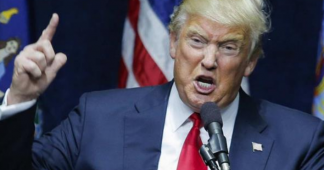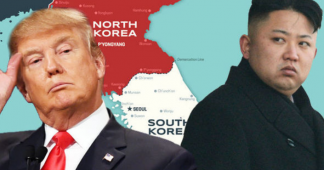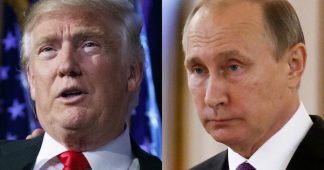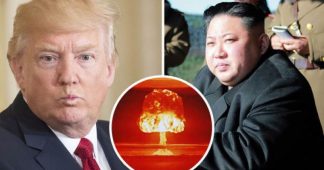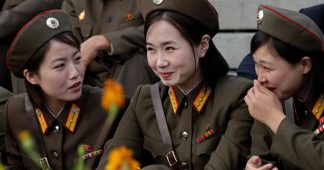In the thirteen days since North Korea tested an intercontinental ballistic missile capable of reaching large portions of North America, the United States has further escalated its war threats.
• On Thursday, US ambassador to the United Nations Nikki Haley warned that the United States might not send athletes to participate in the 2018 Winter Olympics to be held in South Korea, because it could not guarantee their safety in the event of a war.
• Last Sunday, National Security advisor H.R. McMaster warned that the threat of war between the United States and North Korea is “increasing every day.”
• That same day, South Carolina Republican Senator Lindsey Graham warned that the United States is “getting close to a military conflict” with North Korea, and urged the military to remove the families of US soldiers from South Korea.
These developments have been met with alarmed warnings from within the US foreign policy establishment as well as international bodies.
• On Friday, the Washington Post published a chilling hypothetical narrative by Jeffrey Lewis, a scholar at the Middlebury Institute of International Studies, entitled, “This is how nuclear war with North Korea would unfold.” Lewis spelled out in hair-raising detail a scenario in which “nearly 2 million Americans, South Koreans and Japanese had died in the completely avoidable nuclear war of 2019.”
• On Saturday, the New York Times warned that the Trump administration’s rhetoric on North Korea increasingly resembles that of the Bush administration in the run-up to the invasion of Iraq. The newspaper added, “Outside experts are increasingly concluding that the Trump administration’s threats may not be empty and that officials are seriously contemplating attacking North Korea and its nuclear weapons and missile arsenal.”
• That same day, UN envoy Jeffrey Feltman issued a statement declaring that, after discussion with North Korean leaders, both the UN and North Korea had concluded that “the current situation was the most tense and dangerous peace and security issue in the world today,” warning, “Time is of the essence.”
• On Sunday, at a ceremony to award the Nobel Peace Prize to the International Campaign to Abolish Nuclear Weapons, representatives of the group warned that “mutual destruction” between the United States and North Korea “is only one impulsive tantrum away.”
• On Sunday, conservative columnist George Will strongly hinted that a US attack against North Korea would place the country in violation of international law, noting that “crimes against peace” formed the basis of the Nuremberg tribunal of Nazi war crimes. Will concluded, “The first two counts in the indictments at the 1946 Nuremberg trials concerned waging ‘aggressive war.’”
Such statements underscore the profound unease and concern with which large sections of the US and international foreign policy establishment view a potential war with North Korea. As opposed to the successive wars waged against Iraq, Afghanistan, Libya and Syria, the United States has no international supporters in a potential war against North Korea. It is operating increasingly outside of the framework of international law, with flagrant indifference to the mandates of the United Nations and the consensus of its erstwhile allies.
The administration’s critics within the US political establishment fear that a war against North Korea would be an unmitigated disaster for the United States in every conceivable scenario, involving the deaths, at a minimum, of hundreds of thousands of civilians on both sides of the North Korean border. Such a war would shatter whatever remains of Washington’s standing on the international arena, rendering it a pariah state.
The increasingly bellicose stance toward North Korea, which threatens to engulf it in a war far more disastrous than even the invasion of Iraq, has been a leading driver of speculation over the possibility of a White House palace coup.
In an article published in the current issue of Foreign Affairs, Scott D. Sagan warns that averting a potentially disastrous war with North Korea may present a substantial impetus for removing Trump from office by sections of the military.
Sagan notes that, in some ways, the US standoff with North Korea is even more dangerous than the Cuban Missile crisis, when “strong civilian leaders countered the U.S. military’s dangerously hawkish instincts.” But now, “it is the senior political leadership in the United States that has made reckless threats, and it has fallen to Secretary of Defense James Mattis (a former general) and senior military officers to serve as the voices of prudence.”
He adds, “If senior military leaders believe at any time that Trump is impaired, they have a duty to contact Mattis, who should then call for an emergency cabinet meeting to determine whether Trump is ‘unable to discharge the powers and duties of his office’ and thus whether to invoke the 25th Amendment.”
While no one should underestimate the danger of such a military coup, the idea that the US military leadership would somehow serve to check the Trump administration’s drive to war in the Pacific is wishful thinking. Defense Secretary “Mad Dog” Mattis has threatened genocide against North Korea, warning that a war could lead to the “destruction of its people.” National Security Advisor H.R. McMaster has likewise stated that the United States is prepared to launch a “preventive,” that is, unprovoked, war against North Korea.
As the United States faces an unprecedented acceleration of the breakdown of its postwar hegemony, the possibility exists that it may go to war simply to make good on the Trump administration’s threats.
Meanwhile, the mounting talk of removing Trump from office through impeachment, forced resignation or the invocation of the 25th Amendment increases the pressure on the administration to seek through war a solution to the domestic political crisis gripping the United States.
All of this underscores the immense danger posed by the US nuclear standoff. While there exist factional differences within the US ruling elite over the advisability of a war with North Korea, there is no antiwar faction within the ruling elite. The policy demanded by those factions opposing Trump—an escalation of the conflict with Russia—poses its own danger of an escalation into all-out world war.
Far from warning of the mounting danger of war, the Democratic Party has spent the last two weeks intensifying its campaign over the Trump administration’s alleged collusion with Russia. It is simultaneously working to corrupt public consciousness with its witch hunt against “sexual misconduct” in Hollywood and on Capitol Hill, aimed at rallying an upper-middle-class constituency for its conflict with the Trump administration.
The only social force capable of averting a catastrophic third world war is the international working class. This social force must be mobilized, on the basis of a socialist program, into a mass international antiwar movement, aimed at putting an end to war and the capitalist system that creates it.
Andre Damon
